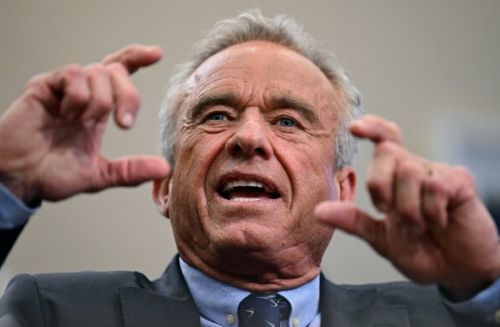

Kennedy outlined his intention to create a government-maintained autism registry.

By Matthew A. McIntosh
Public Historian
Brewminate
Introduction
Robert F. Kennedy Jr. has recently sparked outrage and concern with his proposal to create a national autism registry. Framed as a tool to help scientists investigate potential environmental and vaccine-related causes of autism, the proposal raises deeply troubling implications for civil liberties, medical privacy, and the autism community.
This article explores Kennedy’s controversial proposal, the historical and scientific context, and why many experts, advocates, and public health professionals are warning that it could cause significant harm.
The Proposal
In interviews and public statements, including a notable conversation on the All-In Podcast, Kennedy outlined his intention to create a government-maintained autism registry. He argues that a centralized database of individuals diagnosed with autism spectrum disorder (ASD) would allow researchers to identify causes and trends more effectively, with a particular emphasis on purported links to vaccines — a claim long discredited by the scientific community.
Kennedy has stated:
“We need good surveillance data. We need to know how many people have autism, what the trends are, where they are located, and when they were vaccinated. You can’t do that unless you have a registry.” — RFK Jr., All-In Podcast, July 2023
This idea is consistent with Kennedy’s long-held position as a critic of vaccines, a stance that led to his co-founding of the Children’s Health Defense organization, which has promoted vaccine misinformation for years.
The Problems with an Autism Registry
Medical Privacy Violations
A government registry of individuals with autism raises immediate red flags under the Health Insurance Portability and Accountability Act (HIPAA), which protects individuals’ medical records and personal health information.
Such a registry could open the door to:
- Unauthorized data access by government entities or private actors.
- Future uses of the data without informed consent.
- Potential breaches that compromise sensitive information.
Given the U.S.’s troubling track record with data security, centralizing identifiable medical data is a high-risk move.
Civil Liberties and Historical Parallels
The idea of registering individuals based on a medical diagnosis has disturbing historical precedents. In the early 20th century, individuals with mental and physical disabilities were cataloged and surveilled in the name of “public health” — efforts that fed into the eugenics movement.
In more extreme examples, regimes have used registries to marginalize, surveil, and even eliminate entire groups of people based on characteristics deemed undesirable. While Kennedy’s proposal may lack such intent, it opens the door to future exploitation and stigmatization.
Stigmatization and Harm to the Autism Community
The autism community has long fought to reframe autism as a neurological difference, not a disease to be cured or feared. Organizations such as the Autistic Self Advocacy Network (ASAN) advocate for neurodiversity and warn that policies like Kennedy’s registry would:
- Reinforce the idea that autism is a societal burden or pathology.
- Enable discriminatory practices in education, employment, and insurance.
- Isolate autistic individuals from public life by targeting them for unwarranted scrutiny.
As Julia Bascom, ASAN’s Executive Director, noted in response to the proposal:
“Creating a list of autistic people doesn’t help us — it puts us at risk.”
Scientific Misinformation and Misguided Focus
Kennedy’s proposal is based on the persistent myth that vaccines — particularly the MMR (measles, mumps, rubella) vaccine — cause autism. This myth stems from a fraudulent study by Andrew Wakefield in 1998, which has been thoroughly debunked and retracted. Multiple studies, including a massive Danish cohort study involving over 500,000 children, have found no link between vaccines and autism.
By focusing on a debunked hypothesis, Kennedy risks diverting funding and research away from legitimate areas:
- Genetic and epigenetic factors
- Prenatal environmental exposures
- Improved support systems and interventions
A registry that exists primarily to validate a disproven theory could set back autism research by years.
Voices of Opposition
Public Health Officials

Dr. Paul Offit, Director of the Vaccine Education Center at the Children’s Hospital of Philadelphia, has called the registry proposal “anti-scientific and dangerous.”
“This is not about science. It’s about advancing a conspiracy theory under the guise of public health,” he said in a Washington Post interview.
Civil Rights Advocates
Organizations like the ACLU have historically opposed health-related registries that could be used to target individuals. Though the ACLU has not released an official statement on this specific proposal, their broader opposition to surveillance programs suggests they would likely view Kennedy’s autism registry with skepticism.
Disability Rights Groups
As mentioned, groups like ASAN and the National Council on Disability oppose initiatives that separate autistic people into databases, fearing that such measures erode autonomy and self-determination.
Conclusion
Kennedy’s proposed autism registry is not a neutral scientific tool — it is a politicized policy built on misinformation, with serious implications for privacy, civil rights, and the dignity of the autism community.
It harkens back to dark chapters in public health history and ignores decades of research. Rather than illuminating the causes of autism, it threatens to obscure them beneath layers of fear, mistrust, and surveillance.
Kennedy’s proposal underscores the need for vigilance against pseudoscience and for the protection of marginalized communities from coercive data practices disguised as progress.
Originally published by Brewminate, 05.20.2025, under the terms of a Creative Commons Attribution-NonCommercial-NoDerivatives 4.0 International license.


